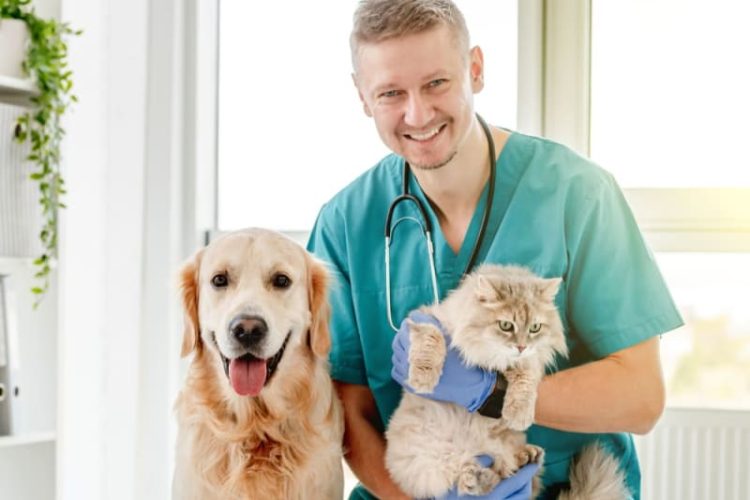When you bring your pet in for a check-up, surgery, or an unexpected emergency, you’re not just visiting a facility—you’re trusting a team of people who have dedicated their lives to animal health. From the receptionist who greets you at the front desk to the technicians assisting in surgery and the veterinarians developing treatment plans, each person plays a vital role in your pet’s care.
Let’s take a closer look behind the scenes to meet the people who make your visit a compassionate, professional, and personalized experience.
The Veterinarians: Compassionate Leaders in Pet Health
Your pet’s veterinarian is the medical expert overseeing their health, diagnosing conditions, creating treatment plans, and performing procedures. But great veterinary care goes beyond medicine—it includes communication, empathy, and understanding your bond with your pet.
What veterinarians do:
- Conduct wellness exams and diagnose illness
- Perform surgeries and dental procedures
- Prescribe medications and create long-term care plans
- Provide client education and support
Veterinarians often build long-term relationships with families, watching pets grow from puppy or kitten to senior years. They carry the emotional weight of both joyful and difficult moments, and they take that responsibility seriously.
What pet owners don’t always see:
Vets often spend hours after clinic hours reviewing lab results, researching complex cases, or making follow-up calls to check in on recovering pets.
Veterinary Technicians: The Unsung Heroes
If veterinarians are the doctors, veterinary technicians are the nurses, anesthetists, lab techs, and dental hygienists—all rolled into one. They are highly trained professionals who provide hands-on medical support and ensure your pet’s care is carried out safely and efficiently.
What vet techs do:
- Assist during surgeries and procedures
- Monitor anesthesia and vital signs
- Draw blood, run lab tests, and take X-rays
- Administer medications and place IV catheters
- Comfort nervous or injured pets
Vet techs are often the ones holding your pet’s paw during a procedure, or sitting with them in recovery to ensure they wake up calmly and safely. Their technical skills and gentle handling make them an essential part of every pet’s visit.
What pet owners don’t always see:
Vet techs often arrive early and stay late, tending to patients who need extra monitoring or simply taking the time to clean and prep for the next day—always focused on the well-being of every animal that walks through the door.
Client Care Team: The Friendly Faces at the Front
Receptionists and client service coordinators are the first people you speak to on the phone and the first faces you see when you walk in. Their work might seem administrative, but it’s deeply rooted in compassion and communication.
What the client care team does:
- Schedule appointments and answer questions
- Handle medical records and billing
- Coordinate follow-ups and medication refills
- Support clients during stressful or emotional situations
They manage a fast-paced environment, juggle urgent calls, and help calm nervous pet parents, all while keeping the front desk running smoothly.
What pet owners don’t always see:
Receptionists often field dozens of calls a day—from routine questions to emergency situations—and do their best to make sure every pet gets the care they need as quickly as possible.
Kennel Assistants and Animal Care Attendants: Behind-the-Scenes Caretakers
Every clean exam room, fresh water bowl, and safely restrained pet is thanks in large part to the kennel and care staff. These team members ensure your pet is clean, comfortable, and cared for—especially during surgery recovery, boarding, or long stays.
What animal care attendants do:
- Walk dogs and clean litter boxes
- Feed and monitor pets during their stay
- Clean and sanitize cages, runs, and exam rooms
- Assist with handling during exams or treatments
These team members are often the first to notice if a pet isn’t eating well or seems uncomfortable, and they communicate that to the medical staff to ensure nothing is missed.
A Team Effort Focused on Your Pet
While each role in a veterinary hospital is unique, every person works together toward a shared goal: helping your pet live a healthier, happier life. No task is too small, no detail too minor when it comes to caring for animals.
From the receptionist who remembers your pet’s name, to the technician who sits quietly with them after surgery, to the veterinarian who explains your options with patience and care—this is what makes veterinary medicine not just a service, but a calling.
Why It Matters to Know the Team
Trust is a huge part of veterinary care. When you know who’s caring for your pet—and understand the roles they play—it creates a stronger partnership between you and your veterinary team.
- You feel more comfortable asking questions.
- You know who to call when you need something.
- You trust that your pet is in good hands, even when you’re not there.
Final Thoughts
Veterinary care is more than diagnostics and prescriptions—it’s a deeply human effort supported by passionate professionals who care for every pet like their own. The next time you visit, take a moment to thank the team behind the scenes. They may not all wear stethoscopes, but each one plays an important part in keeping your beloved companion happy and healthy. We recommend Douglas Animal Hospital.

